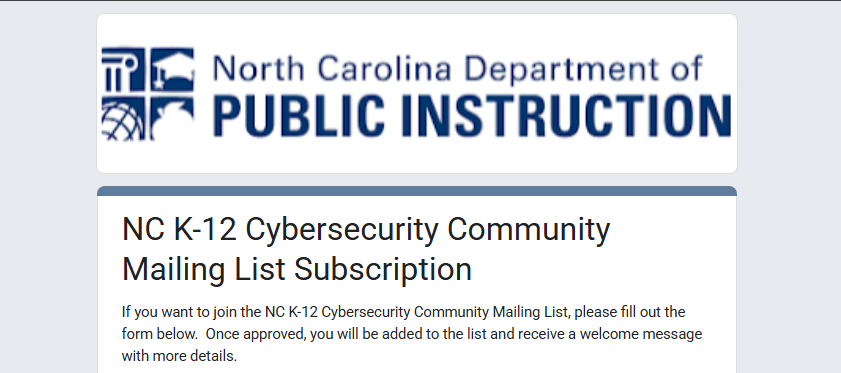NCDPI K-12 Cybersecurity Program

Overview
In 2021, NCDPI established the K-12 Cybersecurity Program with a purpose of organizing and aligning business and technical cybersecurity functions holistically across the state so that PSU and NCDPI stakeholders have greater visibility into the people, processes, and technologies deployed and have a measurable way to determine whether those efforts are sufficient and correct for current and future needs.
The goal is to help all PSUs achieve Strong Cyber Hygiene!
PSUs can find more details about the premium current services and resources provided by the program below AT NO COST to the PSUs
- Security Awareness and Skills Training
- Email and Web Browser Protection
- Network Infrastructure Management
- Malware Defenses
- Continuous Vulnerability Management
- Inventory and Control of Enterprise Assets
- Account and Access Control Management
- Network Monitoring and Defense
- Incident Response Management
- Service Provider Management
- Network and Cybersecurity Consulting
In addition, the K-12 Cybersecurity Program has several partners with related services and resources available to the PSU community:
- NCLGISA IT Strike Team – The IT Strike Team is a group of NCLGISA members that volunteer their time and talents to help out in times of need. The Strike Team has partnered with NC Emergency Management to provide IT support where needed in time of disaster but is also available to any NCLGISA member who needs more resources to address emergency issues.
- North Carolina National Guard – The North Carolina National Guard CSRF mission is to conduct defensive cyberspace operations to support mission requirements as directed by The Adjutant General or Governor. Specifically for North Carolina, the CSRF provides cyber security assistance to State, Local, and Critical Infrastructure providers.
- NCDPI NC Digital Learning Plan – Framework for growth and continuous improvement in the area of Digital Teaching and Learning for NCDPI, public school units and schools across the state. View data, action steps and metrics for the state’s Digital Learning Initiative.
Find list of all available resources here
Management
The K-12 Cybersecurity Program is composed of cross-functional heterogeneous teams to work on tasks and deliverables of the projects. These teams will adapt and evolve over time, but identifying key members will be extremely important to getting the project started with good momentum. The teams should include representatives from all organizations that will interface with the Cybersecurity Program.
- Cybersecurity Executive Committee (CEC)
- The purpose of the executive committee is to provide the priority and policy advisory for the project and ensure the alignment of state agency and legislative requirements.
- The purpose of the executive committee is to provide the priority and policy advisory for the project and ensure the alignment of state agency and legislative requirements.
- Cybersecurity Core Teams (CCT)
- The core set of teams and organizations that collectively work together as part of the NCDPI K-12 Cybersecurity Program in providing the umbrella of cybersecurity services and resources for the PSUs
NCDPI, Friday Institute, MCNC, NCJCTF, NCDIT
- The core set of teams and organizations that collectively work together as part of the NCDPI K-12 Cybersecurity Program in providing the umbrella of cybersecurity services and resources for the PSUs
- Cybersecurity Advisory Council (CAC)
- The CAC consists of PSU cybersecurity leaders who meet monthly to discuss relevant threats, updates, and innovations. Overall focusing on supporting PSUs and NCDPI in improving the K-12 cybersecurity posture.
Key Program Contact
NCDPI K-12 Cybersecurity Team
k12cybersecteam@dpi.nc.gov
Strategy
The North Carolina K-12 Cyber Objectives, Recommendations, and Essentials (NC K-12 CORE) is a comprehensive strategy aimed at enhancing the cybersecurity awareness, practices, and posture of PSUs across North Carolina. This approach incorporates cybersecurity and data privacy best practices from national frameworks while ensuring alignment with specific NC educational initiatives, ultimately fostering a secure digital teaching and learning environment for all K-12 stakeholders.
Please visit the NC K-12 Cyber Objectives, Recommendations, and Essentials (NC K-12 CORE) page for more information regarding these strategies.
Key Program Outreach and Engagements
- Register for upcoming cybersecurity events and be notified of future events at NCDPI’s Eventbrite Page
- Digital Leaders Exchange 2024 – Data Privacy and Cybersecurity, September 9-12, 2024
- Pitt County Schools Tech Fest 2024, August 7, 2024



